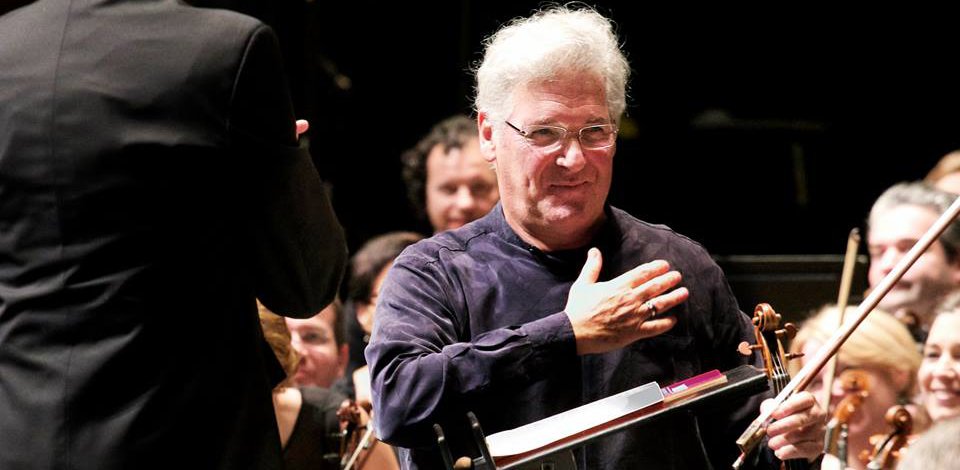Iván Fischer yet again arranged a programme full of virtuosity, as usual. It came as no surprise that the conductor revealed profound and sharp combinations to his audience so naturally. The Mozart and Mendelssohn pieces framing the Budapest Festival Orchestra’s latest programme were a combination like that: the overture to The Magic Flute (K. 620) and the overture as well as the incidental music to A Midsummer Night's Dream (Op. 21 and 61). Both pieces are about mysterious worlds, sublime and funny secrets, where the happiness of lovers is at stake, and each of them includes tales and playfulness, while depicting the fabric of society with great sensitivity and humour. The spirit and mood of the two overtures rhyme slightly with the opening gestures of ceremonial chords. These two pieces usually do not follow each other in concert programmes; this time, however, the concert was opened by the overture to The Magic Flute (in March The Magic Flute conducted and arranged by Fischer will be performed by the Festival Orchestra in its entirety – the overture this time could even serve as a foretaste of this), while the incidental music to A Midsummer Night's Dream was featured in the second part. And between the two pure and noble magical pieces of music there was another similarly pure, noble and magical composition, which is widely believed to be one of the most beautiful and perfect violin concertos by Mozart, Violin Concerto in A major (K. 219), played on the instrument of world-class soloist Pinchas Zukerman.
The Israeli violinist is 66 years old, and I have been going to concerts for 43 years and writing reviews for 35 years. That’s reason enough to suspect that I have heard Zukerman playing in Budapest many times, in fact I have attended each and every concert of his for decades whenever he came to Hungary. Why? As odd as it might seem, because I have never heard him give a full, exciting or remarkable performance. He was initially very good of course for decades, a real brand and star violinist with refined, pure and elegant technique – but impersonal, lacking emotions and formal at the same time. And I wouldn’t be happier to find out I was wrong. So I went to Zukerman’s concerts again and again in the hope that he would eventually refute my earlier experiences. With him I was like the loyal lottery player. Having played for decades, fortune eventually smiles on you when you least expect it. And this time, it happened. The last time Zukerman was a guest musician of the BFO – when he even conducted the orchestra, and was accompanied by his cellist wife – was quite embarrassing: he played the violin in a tired and mistuned manner, and his conducting was hollow. We had to forget it all as quickly as possible. Yet his performance turned out to be a great success, drawing enthusiastic applause. After all this, I still cherished a vague hope.
Out of the blue and to my surprise, he then played the violin in a clear, light and pure way without any trace of powerless technique, it contained noble and authentic gestures, nice dynamics in the key movements and inspiration in the slow movement, and the whole concerto seemed to be rendered in the spirit of timeless wisdom above the clouds. Hats off! We had been waiting for this for ages, but it was worth it. Being pleasantly unpretentious, he didn’t give an encore, but as my acquaintances told me, he had played Brahms’ solo Cradle Song to a little girl sitting in the first row on the previous day.
To the pleasure of the audience, the overture to The Magic Flute has an elated introduction and a very positive and fast main section with abundant string sounds, a flexible bass tone, chattering woodwinds and ceremonial brasses. Iván Fischer’s conducting was the abridged form of the composition itself: humour, philosophy, sanctity and childish playfulness in a nutshell. The overture and the eight movements of the incidental music to A Midsummer Night's Dream resembled an extremely colourful picture book with fairies and night, a hee-hawing donkey and wedding procession – music that tells stories in soft sounds, dynamic rhythms and gentle legato tunes. A twittering flute, singing horn, fairies and a nocturnal forest. Once again, Fischer did an excellent job as a conductor, his orchestra was well prepared and played a whole panoply of techniques. And they had three great partners: the excellent Pro Musica Chamber Orchestra from Nyíregyháza sang freshly and clearly at the hands of choirmaster Dénes Szabó in the two vocal movements (Fischer instructed their members wearing white dresses to sit among the orchestra musicians to blend the vocal sounds with the instrumental sounds better), while solos were performed by two renowned singers, soprano Anna Lucia Richter and mezzo-soprano Barbara Kozelj, with cultural, sensitive and atmospheric suggestivity.


